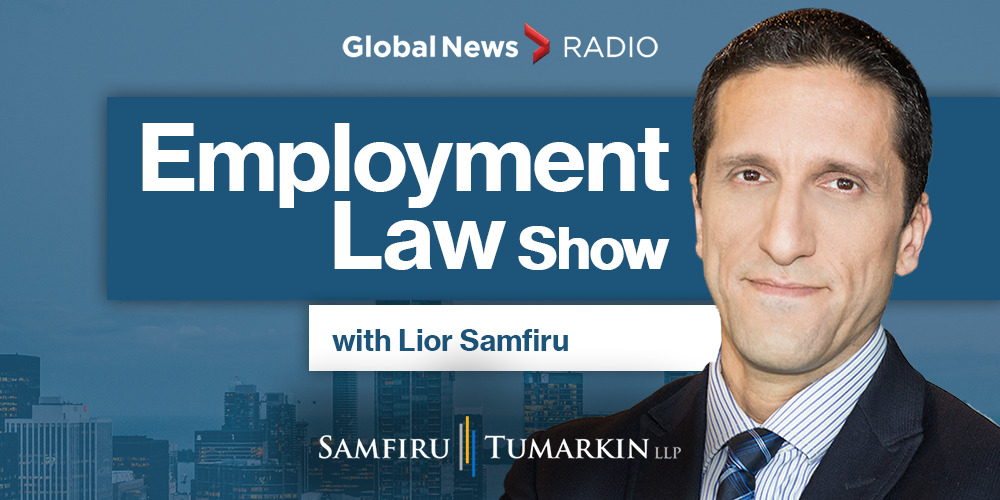Employment Law Show 640 Toronto – S10 E17

Episode Summary
Common mistakes that employers make and what they should be doing instead, dating in the workplace, how to deal with unpaid overtime, and more on Season 10 Episode 17 of the Employment Law Show on Global News Radio 640 Toronto.
Listen below as Employment Lawyer Lior Samfiru, Partner at Samfiru Tumarkin LLP, reveals your workplace rights in Toronto, the GTA, Hamilton, London, and across Ontario on the Employment Law Show. Lior shatters myths and misconceptions about severance pay, terminations, workplace harassment, overtime pay, wrongful dismissal, constructive dismissal, duty to accommodate, independent contractors, and more.
Listen to the Episode
Episode Notes
I recently went on a date with a colleague. When my employer found out they informed me it was against policy, and I was fired for cause. Can they do that?
A policy that prohibits dating in the workplace is only effective and enforceable if employees are made aware of the policy and agree to abide by it. In this case, it sounds like you were not even aware of this policy, which is a problem for your employer. You can’t be expected to comply with a policy or be punished for breaking it if you haven’t even seen it and agreed to it. The second issue here is that even if you had known about the policy, it was probably not enough to justify firing you “for cause“. Terminations for cause are extremely difficult to establish and are reserved for the worst offenders, in situations where the relationship between the employer and employee cannot be repaired. It doesn’t sound like you were deserving of a “for cause” termination – in which case you would be owed severance.
If an employee was let go or suspended for not complying with an employer’s vaccine mandate, now that the vaccine passports are ending, would I be entitled to severance?
If you’ve been suspended or put on a leave or let go because of your vaccination status you’re owed severance. And if the employer didn’t pay that to you, that’s a wrongful dismissal. But now governments are getting rid of vaccine mandates, it only serves to reinforce the strength of an employee’s case that if their employer wanted them gone, they were owed severance.
LEARN MORE
• Vaccine passports in Ontario: The facts
• Employee rights when employers remove vaccine mandates
I’ve worked for my employer for 20 years, and I signed a conflict of interest and moonlighting policy. I’ve been offered a contract position at another company in the same line of work. Can I do both?
It would be a conflict if you took the contract with the other company. If you do this and your current employer doesn’t approve, they’ll be able to fire you for cause. The only way you can do this and not be fired for cause is if you tell them, and explain to them why it shouldn’t interfere with your work at their company. If they agree, get their consent in writing, and then you can go ahead and do it.
I had a stroke a month ago and my company has long-term disability coverage. Will I be able to transition to LTD, or will my company package me out?
Your company can’t package you out – that would be illegal and a human rights violation. If you have long-term disability coverage that policy will say how long you have to be off work before you qualify. If you’re not able to go back to work within that time frame, then yes, you can absolutely transition to long-term disability. That could potentially pay you benefits until age 65 if you need it.
Can an employee get in trouble for donating to a political cause, even if the information about donations was hacked?
If an employee is let go because of that – and an employer can always let someone go – but it would be a termination without cause. In other words, they would be owed severance. The fact that they contributed to a political cause or fundraiser does not result in a for-cause dismissal. If an employer thinks they can terminate an employee for cause for that reason, that is actually a wrongful dismissal, because those donations have nothing to do with the job.
With respect to conflict of interest agreements and non-compete clauses, how can an employer dictate what an employee does on their personal time?
An employer can have a say in how an employee spends their time to the extent that it impacts their business. An employee is expected to act in the best interests of their employer. For example, if that employee is now benefiting a competitor of the employer, that could hurt the main employer’s business. Because of that, the employer is not obligated to accept that. So, if the employee works for a computer company on the weekend and he moonlights at MacDonald’s, then that would be none of the computer company’s business. But if that same employee works on the weekend for a major competitor, then all of a sudden that is a problem, and they have an interest in ensuring certain things don’t happen.
I’m on long-term disability, and I want to buy a home. Do I have to disclose the mortgage to my insurer? Can I get a special letter from the insurance company or CPP declaring that those payments are guaranteed income?
For the mortgage, you do not have to disclose to the insurance company, and the mortgage loan is not considered income. It will not impact your disability benefits. In terms of getting a letter, you can absolutely do that. You will get a letter stating that you are receiving a certain amount per month, and your bank can tell you exactly what information they need to see in the letter. That won’t be a problem either.
I’m a truck driver and I wore my company jacket while protesting on Parliament Hill. Could I be in trouble with my employer?
You could potentially be in trouble with your employer but only if your employer wants to let you go because of that. If they choose to let you go there is nothing you can do to stop that. But if you are let go, it would be a termination without cause, meaning they would have to pay you severance.
I’m a self-employed courier. If I increase the amount on my invoice and they refuse to pay, am I owed severance?
You would be entitled to severance if they let go. You would not be entitled to severance if they refuse to pay you more and you decide to leave.
LEARN MORE
Employee vs. Independent Contractor Misclassification
I’ve been trying to return to work from a disability leave over the past month. I’m not getting any response from my employer. What do I do now?
This is a very common situation for people to find themselves in. You’ve been off work on disability, and you want to return to work, and the employer doesn’t want to bring the employee back so they ignore the employee and think they will forget about it and move on. But an employer has to deal with you. If you’re trying to come back from a leave, they have to make all efforts to bring you back if you were off because you were sick. The moment they try to ignore you, that’s a problem that could be a human rights violation that in itself could be considered a termination of employment.
There are two ways to deal with this. The first is to treat this as a termination and proceed to get compensation. The second is to get an employment lawyer to give the company notice that they cannot ignore the issue – because they cannot ignore an employment lawyer. If you want to go back to work, your employer has to deal with you. They have to try to find you a job, and if they tried and there’s nothing available despite their best efforts then, and only then they can terminate your employment with severance.
My company just told me that because of restructuring I have to take a demotion. I would like to know if I can refuse and if they can fire me?
Absolutely, you can choose not to accept a demotion. Can they fire? Yes, they can because an employer can always let you go. But severance will have to be paid. The fact that you refused a demotion does not mean that there is cause to terminate your employment. In fact, if they impose a demotion unilaterally, that would be a constructive dismissal. An employer does not have a right to demote an employee, and that’s always going to be a constructive dismissal. Be very careful about accepting something like a demotion because that can open the door to repeated, negative changes to the terms of your employment.
I quit my job because my employer owed me overtime and he refused to pay. Is there something I can do to get the money owing?
There is absolutely a way to get the money you’re owed. You can contact my firm, or you go to the Ministry of Labor to recover overtime pay, and you’ll get it paid. But it’s more interesting than that – if you’re owed overtime pay and your employer won’t pay you and that’s why you leave, that’s a constructive dismissal. You’re not leaving because you don’t feel like working. You’re leaving because your employer is not living up to his end of the bargain. If your employer is not paying you what they’re supposed to speak to an employment lawyer and get help to get the compensation you’re owed.
Common mistakes that employers make, and what they should be doing instead
#1) Fire for cause or suspend employees
A common mistake employers make is to fire someone for cause without severance if they’re not vaccinated or put them on an unpaid leave of absence. In either case, the employee is owed severance, and in some cases that could be as much as two years’ pay. You cannot be fired without severance because of your vaccination status.
What employers should do instead is if they want an employee gone because they’re not vaccinated, pay them the severance. Otherwise, they can work with the employee to provide some sort of accommodation. Employers are not doing that and they’re going to ultimately have to pay the severance bill.
#2) They don’t properly investigate and resolve workplace harassment issues
An employer is under a strict legal duty to take any harassment allegations seriously, investigate any claims, and do whatever they can to resolve those issues and make sure that the workplace is healthy and productive. It isn’t just a moral obligation; it is also a legal obligation. Some employers might say that it’s too hard to investigate harassment issues and expect employees to resolve the issues on their own. They cannot do that. If you are an employer and you have an employee who makes an allegation of harassment you have to investigate and figure out a solution. If an employer does not do that they could face a constructive dismissal claim from an employee.
#3) Put employees on a temporary layoff
An employer does not have a right to put an employee on a temporary layoff. If they do, the law considers that to be a termination – even if the employer doesn’t look at it that way. Regardless of whether the employer hopes or intends to bring the employee back, the employee has the ability to consider that layoff as a termination. It’s called constructive dismissal. An employer can have an employment agreement that gives you the right to lay them off temporarily. Otherwise, they have to pay severance.
#4) Employers don’t properly use employment agreements or maybe they don’t even have employees signed agreements on time
Employers often don’t realize it’s to their advantage to have their employees sign an employment agreement. Without an employment contract, the law automatically affords employees many different rights. Employment agreements might be disadvantageous to employees because they can restrict an employee’s rights. A comprehensive employment agreement gives employers flexibility and power. If an employee is asked to sign a new employment agreement during their employment, an employer must provide some benefit to the employee in exchange for signing it. Employees should always have new employment agreements reviewed by an employment lawyer at Samfiru Tumarkin LLP.




